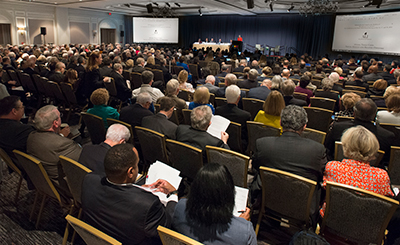Conducted jointly with the European Law Institute, this project will study, identify, and collate the existing and potential legal rules applicable to transactions in data as an asset and as a tradeable item and assess the “fit” of those rules with these transactions.
Because of the innovative, joint approach of this project, the structure of the project will vary somewhat from the traditional ALI structure. The project aims to develop a set of transnational Principles to provide guidance to parties in the data economy, as well as to courts and legislators worldwide. Because data does not have a “location,” the goal is to have a common set of Principles that would apply wherever the parties happen to be.
This project proposes a set of legal principles to govern key aspects of the data economy, and is broken into six Parts:
- (I) General Provisions
- (II) Data Transactions
- (III) Data Rights
- (IV) Security Interests in Data
- (V) Third Party Aspects
- (VI) Multi-State Issues
Reporters and Chairs
Neil B. Cohen
Reporter, Data Economy
Neil B. Cohen is the Jeffrey D. Forchelli Professor of Law at Brooklyn Law School and teaches courses in domestic and international commercial law, contracts, and conflict of laws. For over two decades, Professor Cohen has been a key participant in major domestic and international law reform projects with respect to commercial transactions. He served as Reporter for Revised Article 1 of the Uniform Commercial Code and for ALI’s Restatement of the Law of Suretyship and Guaranty. Professor Cohen currently serves as the Director of Research of the Permanent Editorial Board for the Uniform Commercial Code. In addition, he has been a member of several drafting committees for revising various articles of the Uniform Commercial Code, including the two most recent revisions of Article 9 (Secured Transactions).
Christiane C. Wendehorst
Reporter, Data Economy
Christiane Wendehorst has been Professor of Civil Law at the University of Vienna since 2008. Amongst other functions, she is founding member and President of the European Law Institute (ELI); chair of the Academy Council of the Austrian Academy of Sciences (ÖAW); and member of the Academia Europea (AE), the International Academy for Comparative Law (IACL), The American Law Institute (ALI) and the Bioethics Committee at the Austrian Federal Chancellery. Currently, her work is focused on legal challenges arising from digitalization. She has worked as an expert on subjects such as digital content, Internet of Things, artificial intelligence and data economy.
Lord John Thomas of Cwmgiedd
Project Chair, Data Economy
Lord John Thomas is one of the European Law Institute’s founding members and currently serves as its First Vice-President. He was a practicing barrister in England and Wales until 1996, a Judge of the High Court and Court of Appeal of England and Wales (1996–2013) and then Lord Chief Justice of England and Wales (2013–2017). He was President of the European Network of Councils of the Judiciary (ENCJ) (2008–2010). He is Chairman of the Welsh Government’s Commission on Justice in Wales, Chairman of the UK Financial Markets Law Committee, Chancellor of Aberystwyth University (from January 2018), an Honorary Fellow of Trinity Hall, Cambridge and a Fellow of the Universities of Bangor, Cardiff and Swansea.
Steven O. Weise
Project Chair, Data Economy
Steven O. Weise is a partner in the Corporate Department at Proskauer Rose, Los Angeles. He practices in all areas of commercial law. Steven’s experience in financing is extensive, especially in those secured by personal property, including structured financing. He also handles matters involving California real property anti-deficiency laws, workouts, guarantees, sales of goods, equipment leasing, commercial paper and checks, letters of credit, and investment securities. Steven’s experience covers e-commerce, contract law (including “plain English” drafting), legal opinions, and consumer credit law compliance matters. In addition, Steven lectures widely on commercial law topics and legal opinion letters and is the author of over 100 articles on these topics.
The ALI Adviser is intended to inform readers about the legal topics and issues examined in many of ALI’s current projects; posts do not necessarily represent the position of the Institute taken in those projects. Posts on The ALI Adviser are written by ALI project participants, ALI members, and outside sources. Completed work is available to purchase online.

